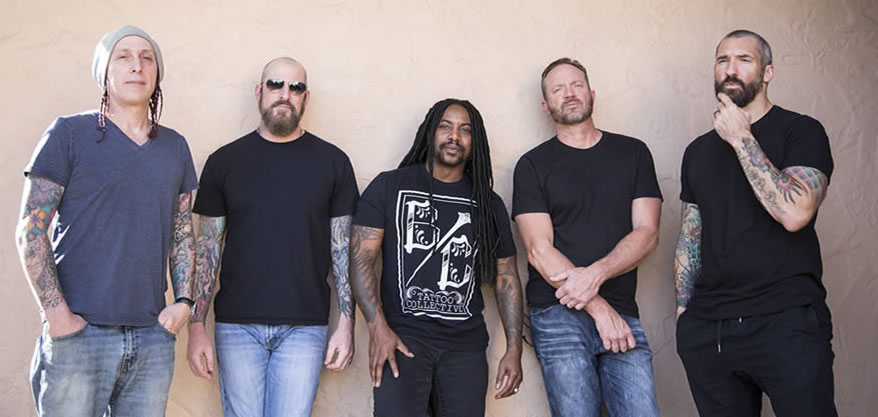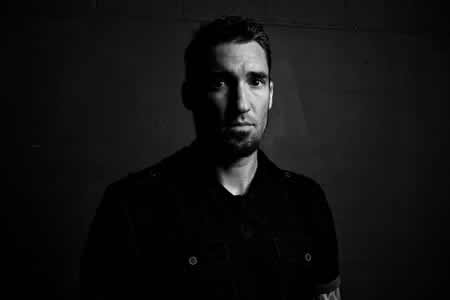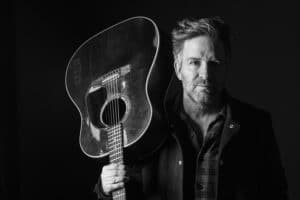Sevendust guitarist Clint Lowery’s moment of clarity: ‘I knew I was ready’

Sevendust is Morgan Rose (from left), John Connolly, Lajon Witherspoon, Vince Hornsby and Clint Lowery. (Courtesy of Travis Shinn)
Sevendust guitarist Clint Lowery's moment of clarity: 'I knew I was ready'
Guitarist Clint Lowery left the heavy rock band Sevendust in 2004, but it would take another three years before he hit bottom.

“I was touring with Korn, and I had a bunch of things happen to me,” Lowery says. “I was arrested in Slovakia; I was going through a divorce; I was living a very unmanageable life. The guys in Korn asked me to please slow down, but I couldn’t, so they sent me home. I woke up after a blackout, and my manager said, ‘Hey, man, they want you to go home.’
“I had lost everything, and my wife had told me the she wanted a divorce. I had no real relationships, and I was bankrupt spiritually. I had been arrested, and a good friend got me into an addiction treatment center, so there was an institution. The next stop was death. By that point, I was completely willing, because it was almost like a release. I knew I was ready, because I had been beaten down to that level of humility.”
Rock 'n' roll success story
It was no easy task, given the heights to which Sevendust had risen. Influenced by groups like Metallica and Faith No More, the band formed in Atlanta in 1994, releasing a self-titled debut album three years later. Fueled by the singles “Black” and “Bitch,” the record eventually sold 500,000 copies and put Sevendust on the national map. Released in 2000, “Home” peaked at No. 19 on the Billboard 200 chart and gave the band moderate success with the singles “Denial” and “Waffle.” More importantly, it paired the band with just about every other heavy rock act out there, from Korn to Disturbed to Limp Bizkit to Mudvayne to Godsmack.

After crashing and burning overseas, however, he found himself wondering, in treatment, if he would ever be able to play rock ‘n’ roll for a living again.
“I was so scared, and when I was just getting out of treatment, I didn’t think I could do music,” he says. “But when I came back to Sevendust (in early 2008), I learned that I can go wherever a free man can go – it’s all dependent on spiritual maintenance.”
Like most people who go through substance abuse treatment, Lowery began to discover that drugs and alcohol were just a symptom of a problem that was spiritual in nature, and that he could maintain a daily reprieve based on the maintenance of his spiritual condition. Staying in touch with others in recovery proved crucial as he eased back into the Sevendust fold, returning for the album “Cold Day Memory” and getting to know his old friends and bandmates through newly sober eyes.
“When I first got back out here, I was really big into my one-hour ‘sessions,’” he says. “I took a lot of insurance policies out – people I was accountable to, people I could call and check in with, people who were calling me. I called in all those insurance policies on my sobriety, and I still do. I have to do it. I go through phases where I’m not as good about it as I should be, but I recognize quick when I am that way, when I’m white-knuckling it.”
What he’s discovered, however, is that living the program reaps physical blessings as well as spiritual ones: Every Sevendust album since his return has landed in the Top 20 of the Billboard 200, and two of them – 2013’s “Black Out the Sun” and 2014’s “Time Travelers and Bonfires” – landed at No. 1 on the Billboard Hard Rock Albums chart. “All I See Is War” – the band’s most recent record, released in May – currently sits at No. 2 on that chart. Sevendust is currently touring to support that album, and even today, with more than a decade sober, he continues his routine of maintenance, he says.
“I talk to a bunch of different alcoholics on a daily basis, and it boils down to keeping in contact with them, so I can keep in contact with my Higher Power,” he says. “There are a group of us guys, industry guys – 12 or 13 of us – and we do a daily gratitude list every single day. We all share an email, and one thing we always talk about is that when someone we know is hurting, we hope they get the gift of desperation.
“When you have so much pain in your life, that’s the only thing that really wakes you up. You hate to see someone taken all the way down, because that’s a dangerous thing, and it could be the end of their life – but it’s what the individual needs to go through to get this thing. I needed a lot of fire, a lot of pain, a lot of loss to wake up. And what’s unfortunate is that there were guys who told me early on, ‘You don’t need to do this!’ And they were right.”
Carrying the message

“When someone is new, I like to talk about taking it moment to moment instead of one day at a time, because sometimes that’s all you can do, is get through the next 20 minutes,” he says. “For people that get some time, I like to ask them, ‘What’d you do today for another person?’ It’s the little things – that service work aspect, because we all owe a debt. There were a lot of people that helped me, and I think that someone who gets some time and sticks around figure out it’s about doing the next right thing, despite whether you’re drinking or not.
“There’s a good chance I won’t have a drink today, but there’s a lot of people that could probably use help. And when you do the next right thing, you put yourself in a better position to receive these promises. Plus, I know for me that the deeper I get in sobriety, the more doing something wrong just don’t feel right. You can feel it in your gut, in your demeanor. For me, it’s something as little as leaving a piece of trash on the ground, or thinking, ‘I know I could have opened that door a little longer for that lady,’ or getting (mad) and snapping at someone. When those things happen, I’ve got to make amends, or it’s eating my lunch.”
Check Out These Other Artists' Stories






